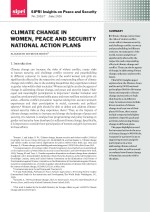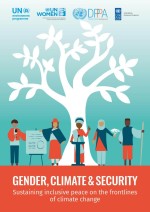-
Reports Highlight the Need for Further Consideration of Gender, Climate, and Security Linkages
June 22, 2020 By Magdalena Baranowska In a recent Stockholm International Peace Research Institute (SIPRI) paper, Elizabeth Seymour Smith, a Research Assistant with SIPRI’s Climate Change and Risk Programme, explores the intersection of climate change, gender, and security in Women, Peace and Security (WPS) national action plans (NAPs) of 80 countries. Using qualitative content analysis, the article finds that states frame and respond to climate change and gender-based security in differing ways. Of the seventeen states that explicitly mention climate change in their NAPs, only three of these—the United States, Ireland, and Finland—actually outline specific action points for increasing women’s participation in climate resilience and peacebuilding. Throughout the article, Smith highlights concrete shortcomings in the existing frameworks, underscoring that “there is significant space and opportunity for the WPS Agenda and WPS NAPs” to “enhance women’s participation in associated decision-making on all scales.” Women must be given agency to respond to the climate and security risks they disproportionately face, rather than being discursively framed as victims needing protection.
In a recent Stockholm International Peace Research Institute (SIPRI) paper, Elizabeth Seymour Smith, a Research Assistant with SIPRI’s Climate Change and Risk Programme, explores the intersection of climate change, gender, and security in Women, Peace and Security (WPS) national action plans (NAPs) of 80 countries. Using qualitative content analysis, the article finds that states frame and respond to climate change and gender-based security in differing ways. Of the seventeen states that explicitly mention climate change in their NAPs, only three of these—the United States, Ireland, and Finland—actually outline specific action points for increasing women’s participation in climate resilience and peacebuilding. Throughout the article, Smith highlights concrete shortcomings in the existing frameworks, underscoring that “there is significant space and opportunity for the WPS Agenda and WPS NAPs” to “enhance women’s participation in associated decision-making on all scales.” Women must be given agency to respond to the climate and security risks they disproportionately face, rather than being discursively framed as victims needing protection.  A focus on women’s agency at the nexus of climate, conflict, and gender (in)security is similarly underscored in a joint report released by the United Nations (UN) Environment Program, UN Women, UN Department of Political and Peacebuilding Affairs, and the UN Development Program. The report, Gender, climate & security: Sustaining Inclusive Peace on the Front Lines of Climate Change, addresses gender norms and dynamics in the climate-security nexus, identifying the ways in which women and girls disproportionately feel the effects of conflict and environmental degradation. Through eleven case studies, the report illustrates that climate change and conflict have the ability to significantly exacerbate existing tensions, gendered or otherwise. In addition to tracing the insecurity faced by women and girls specifically, the case studies highlight shifting gender norms and the importance of female inclusion in peacebuilding efforts. “Evidence from the ground suggests that the impacts of climate change are leading to significant socio-economic shifts, including transforming the traditional gender roles,” the authors write. “If carefully managed, shifting social norms can create entry points for women’s economic empowerment, as well as for their participation in decision-making, conflict prevention and peacebuilding.” Women’s inclusive participation in societal processes, according to the report, is the key to “building and sustaining a more inclusive peace.”
A focus on women’s agency at the nexus of climate, conflict, and gender (in)security is similarly underscored in a joint report released by the United Nations (UN) Environment Program, UN Women, UN Department of Political and Peacebuilding Affairs, and the UN Development Program. The report, Gender, climate & security: Sustaining Inclusive Peace on the Front Lines of Climate Change, addresses gender norms and dynamics in the climate-security nexus, identifying the ways in which women and girls disproportionately feel the effects of conflict and environmental degradation. Through eleven case studies, the report illustrates that climate change and conflict have the ability to significantly exacerbate existing tensions, gendered or otherwise. In addition to tracing the insecurity faced by women and girls specifically, the case studies highlight shifting gender norms and the importance of female inclusion in peacebuilding efforts. “Evidence from the ground suggests that the impacts of climate change are leading to significant socio-economic shifts, including transforming the traditional gender roles,” the authors write. “If carefully managed, shifting social norms can create entry points for women’s economic empowerment, as well as for their participation in decision-making, conflict prevention and peacebuilding.” Women’s inclusive participation in societal processes, according to the report, is the key to “building and sustaining a more inclusive peace.” Read More:
- Unsung Sheroes, Climate Action, and the Global Peace and Security Agendas
- Investing in Girls and Women Could Set The Stage for Peace, Development in Sahel
- Chitra Nagarajan on What’s Changed for Women in Lake Chad Region
- A More Just Migration: Empowering Women on the Front Lines of Climate Displacement
- Left Out and Behind: Fully Incorporating Gender Into the Climate Discourse
Sources: Stockholm International Peace Research Institute, UN Women.
 A Publication of the Stimson Center.
A Publication of the Stimson Center.

 In a
In a  A focus on women’s agency at the nexus of climate, conflict, and gender (in)security is similarly underscored in a
A focus on women’s agency at the nexus of climate, conflict, and gender (in)security is similarly underscored in a 

